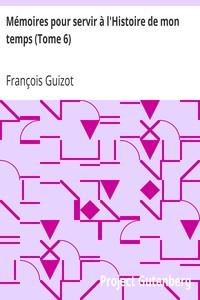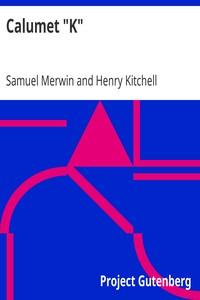|
|
Read this ebook for free! No credit card needed, absolutely nothing to pay.Words: 141494 in 25 pages
This is an ebook sharing website. You can read the uploaded ebooks for free here. No credit cards needed, nothing to pay. If you want to own a digital copy of the ebook, or want to read offline with your favorite ebook-reader, then you can choose to buy and download the ebook.

: Mémoires pour servir à l'Histoire de mon temps (Tome 6) by Guizot Fran Ois - France Politics and government 1814-1830; France Politics and government 1830-1848; Guizot M. (François) 1787-1874; France Foreign relations 1815-1848 FR Biographie Mémoires J@FreeBooksTue 06 Jun, 2023 Introduction 1 Il Novellino INTRODUCTION Perhaps it was after some especially successful night when our unknown compiler had won the approval of a generous signore for his tales, and carried off a purse filled with a few gold coins to his lonely room, that the idea came to him of framing the oral stories in a literary form. He had probably no notion that he was making literature, or founding one of the purest early classics of the young Italian tongue which the wit of the people had shaped out of the mother Latin. For him it was a matter of convenience and utility, though the urge to give a literary shape to the spreading idiom was in the air, deriving as an impellent necessity from the propagation of the spoken word which was widespread in Tuscany and vigorous elsewhere though in dialect forms. The first literary stirrings of the Italian conscience were in the air, and writers brought up on Latin chronicles and used to the mixed French and Italian of works like the Entr?e en Espagne of Nicola da Padua were anxious to try their hands on the wonderful virgin material within their reach. We may reflect in passing what a marvellous opportunity it was for poets and story-tellers, although they did not recognize it as such--to find themselves in the privileged position of having a virgin language at their command, not debased by the ready-made phrase, the trite mechanical expression. With a new language coming into being, nothing or almost nothing is conventionalized. The idea runs straight from the dynamic thought to the natural phrase. There are no ready-made channels to absorb the spontaneity, convenient and inevitable as such moulds afterwards become. So our "man of the Court" dreamed upon his great idea, developed it, thought it over, took counsel maybe of some tale-loving signore and set to work. We may, I think, fairly argue that it was some professional teller of tales, some giullare of more than average education rather than any monk or ascetic who wrote the first manuscript of the Hundred Old Tales, and this for the extremely free, not to say bawdy character of three or four of them. Moreover, the curious and often ridiculous errors in geography, history, chronology and physics which we find in the Novellino is surely proof that the person who compiled it was no great scholar or man of learning. The mistakes which appear in it could hardly have been perpetrated by a learned monk well read in history and the classics. Again, Latin was still the language of science and such scholarship as existed then. The times were rude in a certain sense, though perhaps less rude than is generally imagined, but some of the errors to be found in the tales are so gross and absurd that they could not have been committed to a manuscript by anyone of real learning. Which gives us ground for believing that the original anthologist was of the minstrel class, a giullare of degree and some education, with literary yearnings, stimulated perhaps by the exercises of his French and Proven?al colleagues in the arts of story-telling and song. The French fabliaux, and the works of the French and Proven?al singers and makers of contes certainly inspired writings like the Novellino and the few other contemporary works of a similar character. The former reached a far higher degree of art than they ever attained to in Italy. To the extensive works in thousands of lines which the other romance languages can show, Italy can only put forward the bare skeleton tales of the Novellino, the Conti dei Antichi Cavalieri, the Conti Morali del Anonimo Senese. Earlier works there were in Latin, such as the famous Gesta Romanorum and the Disciplina Clericalis. Several of the tales which appear in the Novellino also figure in Disciplina Clericalis and in the Gesta, as we shall see. To all the poetry of the French and Proven?al bards of the Middle Ages Italy has nothing to oppose. Cantastorie or minstrels there were, but the Italian giullare was considerably lower in the hierarchy of song than his French or Proven?al brothers. In Italy such poems or songs lacked the profound impress of the people's spirit. No memory of these Italian songs has remained, though they must have existed, and perhaps in plenty, but the versifiers of the period were plebian and lowly. They lacked the protection of important courts. While France, Spain and Germany can show a rich epic popular poetry, Italy can only boast a few hundred novelle in prose. The tale or novella was a literary product especially pleasing to the Middle Ages, which was, in the matter of culture, an infantile age. The period seems to have almost a childish affection for the marvellous tale. Learning and intellectual sophistication of any kind was in the hands of a few, was almost a kind of vested interest in which not only the common people, but even the lords and knights themselves had no interest or claim. This was especially the case in Italy, where no vehicle existed for its propagation until the end of the thirteenth century. Therefore to simple minds, unused to the mysteries of literature, save those written in a hermetic and pompous tongue fast disappearing from common use, the tale was a spiritual refreshment aptly suited to the time. In England, too, we see examples of Latin tales as in the De Naturis Rerum of Neckham. But if Italian culture was backward at this time, or non-existent save in Latin forms, it grew very quickly, and from its plebian sources there came into being the new art of Boccaccio. For though the language was new, the Italians were by no means a new people. They had behind them a long uninterrupted literary tradition from which they could with difficulty withdraw themselves. There was even a similarity of spirit between those who clung to the old traditions and wrote in Latin, and the people seeking to express themselves in their young language. The two literatures had a great deal of the same spirit and character. The early Italian prose developed to a great extent along the lines of the earlier chroniclers who wrote in medieval Latin. Nor could it very well be otherwise, for even a new literature of a new tongue requires models, and where should the new nationalist scribes turn for models save to the Latin writings of their own countrymen? It is not too much to say that Italian grew quickly because of its Latin traditions. It is astonishing to think how quickly it did grow, from the simple beginnings of the Cento Novelle to Boccaccio. In less than one hundred years Dante is reached. This rapid growth evidently depended on the fact that Italian was a continuation of Middle-Age Latin. In its spoken form, it had been in use for some time, and it merely required a certain amount of independence and belief in the popular idiom to turn it to literary uses. In the tales which make up the Novellino, we can see how near the form is to the spoken language, especially in those tales which are of contemporary and local origin. The compiler did little more than put into simple Tuscan prose tales that for the most part were well known in oral tradition. When I come to examine the tales individually, we shall see which came from the classics, which from Oriental sources, which from Provence and which were the product of local wit. It is alleged in some quarters that the Novellino or the Cento Novelle Antiche was not the work of a single compiler. This thesis is supported by arguments which point out the diversity of style and colour in the tales. It seems to me that it may also be argued from this that, as indisputably the stories derive from many stories, such as Provence, the Bible, the Greek and Latin classics, and the tales of the moral and ascetic writers, such a variety of style and colour is only to be expected. If one prefers the theory of single authorship--an authorship of course which is limited as the subject matter of the tales was common property--one can find just as many arguments for it as the upholders of the plural authorship theory can lay against it. There are those who deny the authorship of the Iliad and Odyssey to one poet. One cannot pretend to settle a question which still perplexes Italian critics of their own early literature. One may, however, refer briefly to some of the best accredited opinion on the subject. Francesco Coster?, who believes the tales to be written by several hands, writes in his preface to a popular edition of the Novellino: "Nobody has yet, in spite of all the efforts of the learned, arrived at determining for certain the time or authorship of the Novellino. This is very natural, in the case of a work which was obviously written by several people and gathered in volume with time. In the Novellino, Saladin is spoken of, and we know that he died in 1193, during a war with the Christians of the Third Crusade. The book also makes reference to the Cavaliere Alardo di Valleri, who contributed to the victory of Charles d'Anjou at the battle of Tagliacozzo in 1268. From one date to the other there pass some seventy-five years, whence we should have to admit that the author was more than a hundred years old if he were one and the same person. Further, we must take account of the style of the book". This argument of Coster? does not seem very difficult to answer. Free books android app tbrJar TBR JAR Read Free books online gutenberg More posts by @FreeBooks
: Calumet K by Merwin Samuel Webster Henry Kitchell - Psychological fiction; Engineers Fiction; Grain elevators Design and construction Fiction@FreeBooksTue 06 Jun, 2023

: Oscar; Or The Boy Who Had His Own Way by Aimwell Walter - Conduct of life Juvenile fiction; Children's stories; Boys Juvenile fiction; Boston (Mass.) Juvenile fiction; Obedience Juvenile fiction@FreeBooksTue 06 Jun, 2023
|
Terms of Use Stock Market News! © gutenberg.org.in2025 All Rights reserved.






